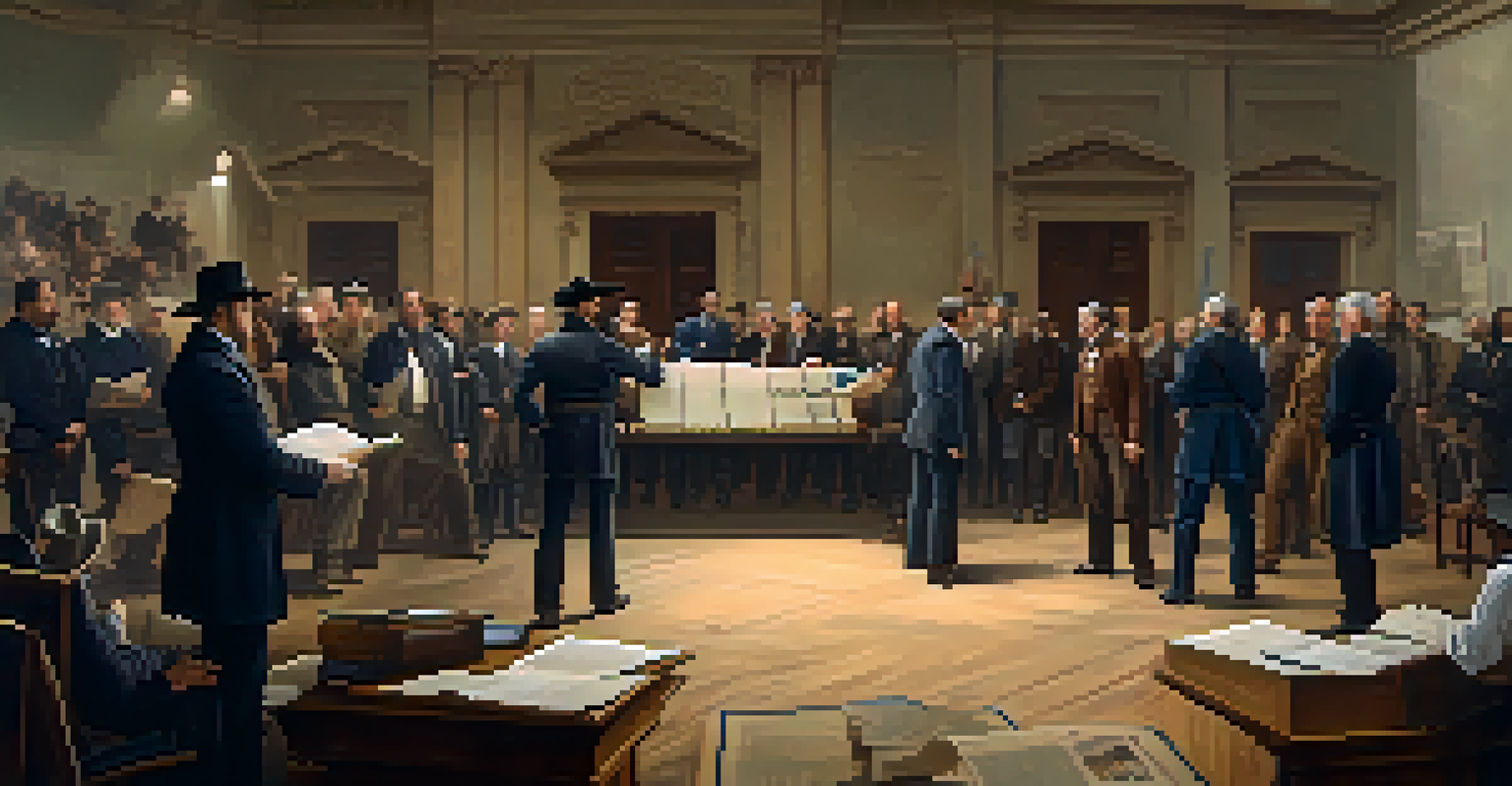Texas and the United States: Annexation and Its Consequences

Understanding Texas's Path to Annexation
Texas's journey towards annexation was rooted in its fight for independence from Mexico. After gaining independence in 1836, Texas was an independent republic for nearly a decade. The desire to join the United States grew due to economic challenges and a longing for stability.
The United States is destined to be the great nation of futurity.
The annexation debate was contentious, as many Americans supported the idea while others feared it would exacerbate tensions over slavery. Texas had a large population of enslaved individuals, which raised concerns among Northern states. Ultimately, the allure of expanding the United States and fulfilling Manifest Destiny fueled the push for annexation.
In 1845, Texas officially joined the Union, becoming the 28th state. This decision not only changed Texas's status but also set the stage for further territorial expansion and conflicts with Mexico.
The Mexican-American War: A Direct Consequence
The annexation of Texas directly contributed to the outbreak of the Mexican-American War in 1846. Tensions were high as the U.S. and Mexico disagreed over the border, particularly regarding the Rio Grande. Mexico viewed Texas's annexation as an act of aggression, leading to increased hostilities.

The war, which lasted until 1848, resulted in significant territorial gains for the United States, including California and New Mexico. This land acquisition further fueled the debate over slavery, as new territories were added to the Union. The war and its outcomes left lasting scars on U.S.-Mexico relations.
Texas's Annexation Fueled Conflict
The annexation of Texas led to heightened tensions between the U.S. and Mexico, ultimately resulting in the Mexican-American War.
In essence, the Mexican-American War was a direct fallout of Texas's annexation, highlighting the complex interplay of politics, culture, and territorial ambitions during this period.
Economic Shifts Following Annexation
Following annexation, Texas experienced significant economic changes. The integration into the United States opened up new markets, leading to an economic boom in agriculture and cattle ranching. Cotton became a dominant crop, and Texas quickly became known for its fertile land and favorable climate.
Texas is a state of mind.
Moreover, the annexation allowed for increased investment in infrastructure, such as railroads and telegraph lines. This connectivity not only enhanced trade within the state but also linked Texas to the broader economy of the United States. The economic landscape began to shift, influencing migration patterns and population growth.
As a result, the annexation catalyzed Texas's transformation into an economic powerhouse, shaping its identity and future growth.
Cultural Identity and Changes in Texas
Annexation also prompted a blending of cultures in Texas. The state had a rich heritage influenced by Native American, Spanish, and Mexican traditions. With the arrival of American settlers, a unique Texan identity began to emerge, characterized by a mix of these diverse influences.
The influx of settlers brought new customs, languages, and practices that began to reshape the cultural landscape. This melding of cultures also influenced Texas's art, music, and cuisine, leading to a vibrant and distinct regional identity. The famous Tex-Mex cuisine, for instance, is a delicious product of this cultural interplay.
Economic Boom Post-Annexation
Following annexation, Texas experienced significant economic growth, particularly in agriculture and infrastructure development.
As Texas evolved, its cultural identity became a point of pride, celebrating both its American and Mexican roots.
Political Ramifications of Annexation
The annexation of Texas had significant political ramifications at both state and national levels. It intensified the debate over slavery, as the addition of Texas raised questions about the balance of power between free and slave states. This growing divide contributed to the sectionalism that would eventually lead to the Civil War.
In Texas, the political landscape shifted as well, with new leaders emerging who championed the state's interests within the Union. The state's size and resources gave it considerable influence in national politics, leading to a legacy of strong political figures hailing from Texas. This influence remains evident today.
Overall, the political consequences of annexation were profound, shaping not only Texas's governance but also the national dialogue on crucial issues of the time.
Impact on U.S.-Mexico Relations
The annexation of Texas had a long-lasting impact on U.S.-Mexico relations, creating a legacy of mistrust and conflict. Following the Mexican-American War, the U.S. acquired vast territories, which embittered relations between the two countries for generations. The war and annexation are often viewed as pivotal moments in the larger narrative of U.S.-Mexico interactions.
Even today, the historical context of these events informs discussions on border security and immigration policies. The memories of the war and its consequences linger, affecting how both nations engage with each other. This complex history continues to shape diplomatic and cultural exchanges.
Cultural Identity Merges in Texas
The arrival of American settlers after annexation blended various cultural influences, creating a unique Texan identity celebrated today.
In essence, the annexation of Texas not only altered the landscape of North America but also set the stage for a complicated relationship that persists to this day.
Legacy of Texas's Annexation in Modern America
The legacy of Texas's annexation can be seen in modern America, from its political influence to its cultural impact. Texas has grown into a significant player on the national stage, with a booming economy and a diverse population that continues to attract newcomers. Its distinct cultural identity also contributes to the broader American tapestry.
Moreover, Texas's history of independence and resilience resonates in its political ethos, often championing states' rights and local governance. This spirit influences national policies and debates, highlighting Texas's role as a bellwether state in American politics.

Ultimately, the annexation of Texas was not just a historical event; it laid the groundwork for the Texas we know today and its ongoing influence in shaping America.